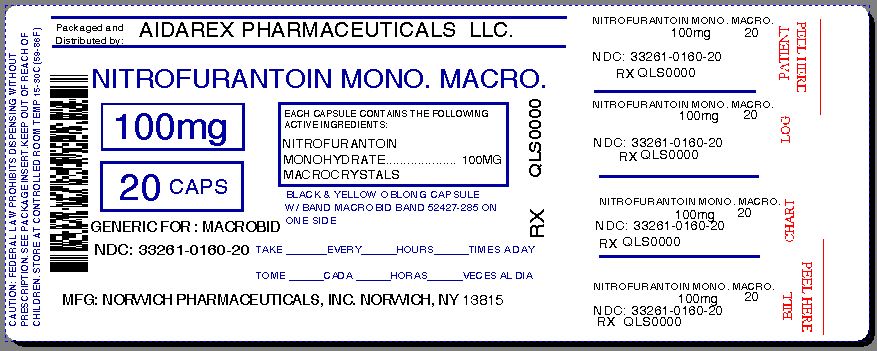
Nitrofurantoin Monohydrate/ Macrocrystalline | Nitrofurantoin Monohydrate/macrocrystalline Capsule while Breastfeeding
What is Nitrofurantoin Monohydrate/ Macrocrystalline | Nitrofurantoin Monohydrate/macrocrystalline Capsule ?
Nitrofurantoin Monohydrate/ Macrocrystalline | Nitrofurantoin Monohydrate/macrocrystalline Capsule safe in breastfeeding?

Nursing Mothers Nitrofurantoin has been detected in human breast milk in trace amounts. Because of the potential for serious adverse reactions from nitrofurantoin in nursing infants under one month of age, a decision should be made whether to discontinue nursing or to discontinue the drug, taking into account the importance of the drug to the mother. (See CONTRAINDICATIONS.)
Nitrofurantoin Monohydrate/ Macrocrystalline | Nitrofurantoin Monohydrate/macrocrystalline Capsule Breastfeeding Analsys
Nitrofurantoin while Breastfeeding
SafeCAS Number: 67-20-9
Excretion into breast milk is clinically non-significant with no side-effects observed among breastfed infants from treated mothers except rare cases of diarrhea. Do not use while the infant is younger of two weeks of age or suffers of G-6-P dehydrogenase deficiency to avoid likelihood of hemolysis. Be aware of false negative results that may be obtained from febrile infants with bacterial cultures when the mother is on antibiotics. Also, the possibility of developing diarrhea due to bacterial flora imbalance.
Nitrofurantoin while Breastfeeding
SafeCAS Number: 67-20-9
Excretion into breast milk is clinically non-significant with no side-effects observed among breastfed infants from treated mothers except rare cases of diarrhea. Do not use while the infant is younger of two weeks of age or suffers of G-6-P dehydrogenase deficiency to avoid likelihood of hemolysis. Be aware of false negative results that may be obtained from febrile infants with bacterial cultures when the mother is on antibiotics. Also, the possibility of developing diarrhea due to bacterial flora imbalance.
Nitrofurantoin Monohydrate/ Macrocrystalline | Nitrofurantoin Monohydrate/macrocrystalline Capsule Breastfeeding Analsys - 2
Nitrofurantoin while Breastfeeding
CAS Number: 67-20-9
Administration of nitrofurantoin directly to infants under 1 month of age and in those with glucose-6-phosphate dehydrogenase (G6PD) deficiency is contraindicated because of potential hemolysis in these infants. However, the time of greatest risk for hemolysis in fullterm newborns without G6PD deficiency might be as short as 8 days after birth.[1] Nitrofurantoin doses in milk are low and it can be used while breastfeeding older infants, but alternate drugs are preferred in mothers of infants under 8 days of age, or infants with G6PD deficiency of any age. Observe infants for possible diarrhea.
Nitrofurantoin while Breastfeeding
CAS Number: 67-20-9
Administration of nitrofurantoin directly to infants under 1 month of age and in those with glucose-6-phosphate dehydrogenase (G6PD) deficiency is contraindicated because of potential hemolysis in these infants. However, the time of greatest risk for hemolysis in fullterm newborns without G6PD deficiency might be as short as 8 days after birth.[1] Nitrofurantoin doses in milk are low and it can be used while breastfeeding older infants, but alternate drugs are preferred in mothers of infants under 8 days of age, or infants with G6PD deficiency of any age. Observe infants for possible diarrhea.
What should I do if already breastfed my kid after using Nitrofurantoin Monohydrate/ Macrocrystalline | Nitrofurantoin Monohydrate/macrocrystalline Capsule?
Nitrofurantoin Monohydrate/ Macrocrystalline | Nitrofurantoin Monohydrate/macrocrystalline Capsule is safe in breastfeeding and should not create any health problem for your baby but in case you feel any health issue associated with Nitrofurantoin Monohydrate/ Macrocrystalline | Nitrofurantoin Monohydrate/macrocrystalline Capsule you should contact your doctor or health care provider. Be it pregnancy or lactation you shall keep your doctor informed.
My doctor has prescribed me Nitrofurantoin Monohydrate/ Macrocrystalline | Nitrofurantoin Monohydrate/macrocrystalline Capsule, what should I do?
Definitely, Nitrofurantoin Monohydrate/ Macrocrystalline | Nitrofurantoin Monohydrate/macrocrystalline Capsule is safe in lactation for baby. No wonder your doctor has recommended it.
If I am using Nitrofurantoin Monohydrate/ Macrocrystalline | Nitrofurantoin Monohydrate/macrocrystalline Capsule, will my baby need extra monitoring?
No extra baby monitoring required while mother is using Nitrofurantoin Monohydrate/ Macrocrystalline | Nitrofurantoin Monohydrate/macrocrystalline Capsule
Who can I talk to if I have questions about usage of Nitrofurantoin Monohydrate/ Macrocrystalline | Nitrofurantoin Monohydrate/macrocrystalline Capsule in breastfeeding?
US
National Womens Health and Breastfeeding Helpline: 800-994-9662 (TDD 888-220-5446) 9 a.m. and 6 p.m. ET, Monday through Friday
UK
National Breastfeeding Helpline: 0300-100-0212 9.30am to 9.30pm, daily
Association of Breastfeeding Mothers: 0300-330-5453
La Leche League: 0345-120-2918
The Breastfeeding Network supporter line in Bengali and Sylheti: 0300-456-2421
National Childbirth Trust (NCT): 0300-330-0700
Australia
National Breastfeeding Helpline: 1800-686-268 24 hours a day, 7 days a week
Canada
Telehealth Ontario for breastfeeding: 1-866-797-0000 24 hours a day, 7 days a week
